

Early Childhood Pedagogy and Care Program
Advanced Level
Course Fee : INR 15999 | $ 200 US Duration: 260 hours or 12 months
Fast Track Mode fee
INR 5000 | $ 60 US
Master Level
Course Fee : INR 19999 | $ 250 US Duration: 370 hours or 18months
Fast Track Mode Fee
INR 6000 | $ 70 US
An Early Childhood Pedagogy and Care Program refers to a structured educational and caregiving initiative aimed at promoting the holistic development of young children, typically from birth to age eight. The American College of Teachers and Trainers is designed this program to provide a nurturing and stimulating environment that fosters children's physical, cognitive, emotional, social, and language development during their formative years.
Key components of an Early Childhood Pedagogy and Care Program often include:
Play-based Learning:
Emphasizing the importance of play in a child's development, the program incorporates activities and experiences that encourage exploration, curiosity, and creativity. Play is seen as a natural way for children to learn and make sense of the world around them.
Developmentally Appropriate Practices:
The program tailors activities and teaching methods to align with the individual needs, interests, and developmental stages of each child. It recognizes that children progress at different rates and have diverse learning styles.
Responsive and Nurturing Caregiving:
Caregivers and teachers in the program provide a safe and caring environment, promoting positive relationships and attachments with children. Responsive caregiving helps build a child's sense of trust and security.
Curriculum Planning:
An effective Early Childhood Pedagogy and Care Program usually includes a well-structured curriculum that outlines the learning objectives, themes, and age-appropriate activities. The curriculum may focus on different areas such as literacy, numeracy, science, art, and social skills.
Observation and Assessment:
Educators regularly observe and assess children's progress to understand their strengths, challenges, and interests. This helps in tailoring activities to meet individual needs effectively.
Inclusion:
The program aims to be inclusive, accommodating children with diverse abilities and backgrounds. It creates an environment where all children feel welcomed and valued.
Parent and Family Involvement:
Recognizing the significance of family in a child's development, the program encourages active involvement and communication with parents or caregivers. Regular parent-teacher conferences and family events help foster a strong home-school partnership.
Professional Development:
Educators and caregivers in the program receive ongoing professional development and training to stay updated with the latest research and best practices in early childhood education and care.
Health and Safety:
Prioritizing the well-being of children, the program adheres to health and safety standards and guidelines to ensure a secure environment.
Continuity in Education:
An effective program may offer a smooth transition from early childhood settings to primary or elementary education, facilitating a seamless learning journey for the child.
These programs offered by the American College of Teachers and Trainers, a globally recognized and accredited institute for teacher training, play a vital role in laying the foundation for a child's future learning and success, promoting lifelong learning, and nurturing well-rounded individuals. They also contribute to closing the achievement gap and ensuring that all children have equal opportunities for growth and development.




